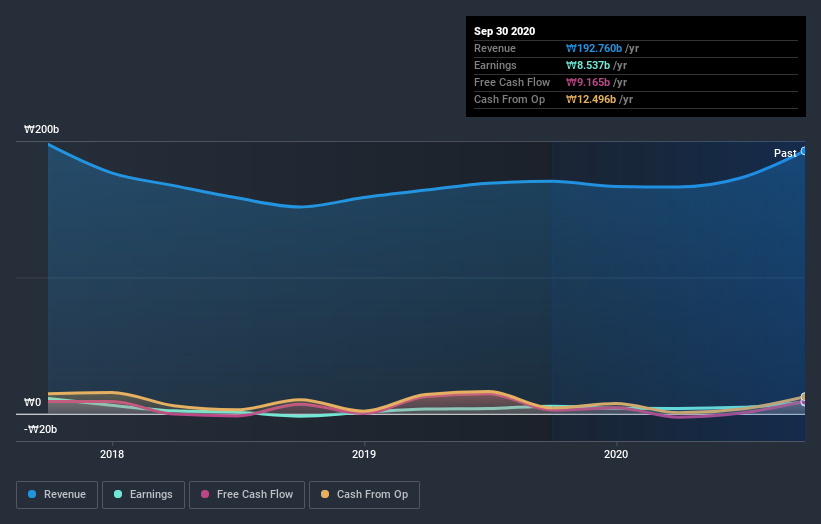- South Korea
- /
- Auto Components
- /
- KOSDAQ:A170030
How Much Of Hyundai Industrial Co., Ltd. (KOSDAQ:170030) Do Insiders Own?

If you want to know who really controls Hyundai Industrial Co., Ltd. (KOSDAQ:170030), then you'll have to look at the makeup of its share registry. Institutions often own shares in more established companies, while it's not unusual to see insiders own a fair bit of smaller companies. Warren Buffett said that he likes "a business with enduring competitive advantages that is run by able and owner-oriented people." So it's nice to see some insider ownership, because it may suggest that management is owner-oriented.
Hyundai Industrial is a smaller company with a market capitalization of ₩151b, so it may still be flying under the radar of many institutional investors. In the chart below, we can see that institutions don't own shares in the company. Let's delve deeper into each type of owner, to discover more about Hyundai Industrial.
Check out our latest analysis for Hyundai Industrial

What Does The Lack Of Institutional Ownership Tell Us About Hyundai Industrial?
Small companies that are not very actively traded often lack institutional investors, but it's less common to see large companies without them.
There could be various reasons why no institutions own shares in a company. Typically, small, newly listed companies don't attract much attention from fund managers, because it would not be possible for large fund managers to build a meaningful position in the company. It is also possible that fund managers don't own the stock because they aren't convinced it will perform well. Institutional investors may not find the historic growth of the business impressive, or there might be other factors at play. You can see the past revenue performance of Hyundai Industrial, for yourself, below.

Hyundai Industrial is not owned by hedge funds. Looking at our data, we can see that the largest shareholder is the CEO Hyun-Suk Kang with 30% of shares outstanding. Meanwhile, the second and third largest shareholders, hold 21% and 0.3%, of the shares outstanding, respectively.
After doing some more digging, we found that the top 2 shareholders collectively control more than half of the company's shares, implying that they have considerable power to influence the company's decisions.
Researching institutional ownership is a good way to gauge and filter a stock's expected performance. The same can be achieved by studying analyst sentiments. We're not picking up on any analyst coverage of the stock at the moment, so the company is unlikely to be widely held.
Insider Ownership Of Hyundai Industrial
While the precise definition of an insider can be subjective, almost everyone considers board members to be insiders. The company management answer to the board and the latter should represent the interests of shareholders. Notably, sometimes top-level managers are on the board themselves.
Insider ownership is positive when it signals leadership are thinking like the true owners of the company. However, high insider ownership can also give immense power to a small group within the company. This can be negative in some circumstances.
It seems that insiders own more than half the Hyundai Industrial Co., Ltd. stock. This gives them a lot of power. So they have a ₩78b stake in this ₩151b business. It is good to see this level of investment. You can check here to see if those insiders have been buying recently.
General Public Ownership
With a 48% ownership, the general public have some degree of sway over Hyundai Industrial. While this group can't necessarily call the shots, it can certainly have a real influence on how the company is run.
Next Steps:
I find it very interesting to look at who exactly owns a company. But to truly gain insight, we need to consider other information, too. To that end, you should be aware of the 1 warning sign we've spotted with Hyundai Industrial .
Of course this may not be the best stock to buy. So take a peek at this free free list of interesting companies.
NB: Figures in this article are calculated using data from the last twelve months, which refer to the 12-month period ending on the last date of the month the financial statement is dated. This may not be consistent with full year annual report figures.
If you’re looking to trade Hyundai Industrial, open an account with the lowest-cost* platform trusted by professionals, Interactive Brokers. Their clients from over 200 countries and territories trade stocks, options, futures, forex, bonds and funds worldwide from a single integrated account. Promoted
Valuation is complex, but we're here to simplify it.
Discover if Hyundai Industrial might be undervalued or overvalued with our detailed analysis, featuring fair value estimates, potential risks, dividends, insider trades, and its financial condition.
Access Free AnalysisThis article by Simply Wall St is general in nature. It does not constitute a recommendation to buy or sell any stock, and does not take account of your objectives, or your financial situation. We aim to bring you long-term focused analysis driven by fundamental data. Note that our analysis may not factor in the latest price-sensitive company announcements or qualitative material. Simply Wall St has no position in any stocks mentioned.
*Interactive Brokers Rated Lowest Cost Broker by StockBrokers.com Annual Online Review 2020
Have feedback on this article? Concerned about the content? Get in touch with us directly. Alternatively, email editorial-team (at) simplywallst.com.
About KOSDAQ:A170030
Hyundai Industrial
Manufactures and sells automotive seat components in South Korea and internationally.
Excellent balance sheet second-rate dividend payer.
Market Insights
Community Narratives




